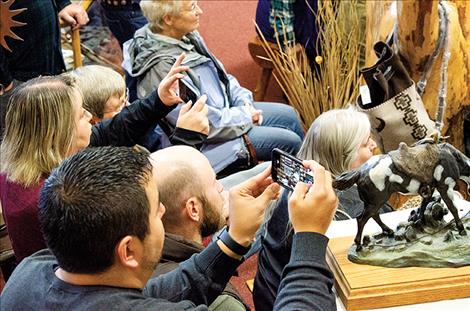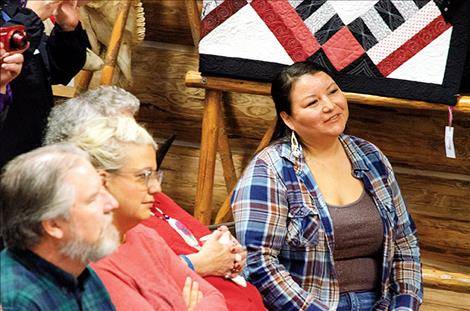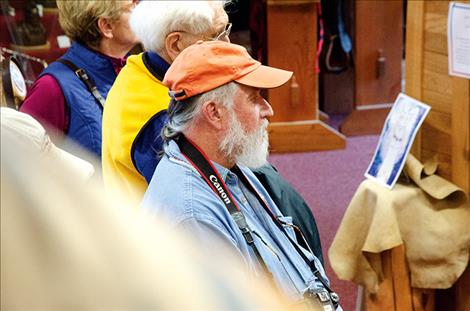Victor Charlo publishes second poetry book
Hey savvy news reader! Thanks for choosing local.
You are now reading
1 of 3 free articles.
CHARLO – Victor Charlo, 80, listened to a round of applause after reading from his second book “Dirty Corner and Other Poems” to an audience at the Ninepipes Museum of Early Montana on Saturday afternoon, but he later said he traded something for his success as a poet.
It all started when he discovered writing as a small boy. He really liked the idea of it. He started “scribbling” on pieces of paper, literally scribbling. He didn’t know the alphabet at this age. He took those pieces of paper and put them in a tin can that he buried out behind the root cellar around his home in Evaro. He doesn’t remember why he needed to put the pages in the ground, but he smiled and said they might still be there. He now lives in Dixon.
As the great-great-grandson of Chief Victor Charlot (later spelled Charlo) of the Bitterroot Salish, writing was divergent from traditional cultural ways. Victor said the Salish language is based on an oral tradition – not writing. He said his parents encouraged him to focus on “white ways” to try and help him “make it” in the world, so he never learned to speak Salish fluently.
Victor’s scribbles developed into words in school as he attended elementary school in Frenchtown and then went to high school at Loyola in Missoula. He said he lived on the diving line between Arlee and Frenchtown and ended up riding the bus going south. One of his poems called “First Grade Bus Ride” explores a memory he had of developing his love for words and his sense of humor. In the poem, he was riding on a yellow bus from Evaro: “I felt smart and tried to memorize/ how to spell bread by looking at Eddy’s/ bread sign but the sign was fresh daily.”
In high school, he played football, and after practice, he would often end up sitting around for hours waiting for a ride home. To occupy the time, he began scribbling on paper again, but this time, it was in the form of poetry inspired by poems like Samuel Taylor Coleridge’s “Kubla Khan” and others. “I didn’t think I’d ever be a writer, but I liked playing around with it,” he said.
He decided to make his parents happy and study to be a priest after high school. He went to six years of seminary. He also studied Latin and Greek but wasn’t fluent. Learning languages didn’t come easily to him. But he still had his sights set on mastering writing, so he went to the University of Montana to get a degree in English and later picked up a master’s degree. “I wanted to be the best English speaker that I could be,” he said.
He also spent time with famous poet Richard Hugo. Victor brought Hugo to the Flathead Indian Reservation to show him around. Hugo even wrote a poem for Victor called “Indian Graves at Jocko.” Victor would write “Letter to Hugo from Dixon” for his friend.
Victor once lived in Arlee at a place known as “Dirty Corner.” He would later use this name for the title of his second book. The corner is located south of town on U.S. Highway 93 on a deadly turn where several fatal car crashes have occurred, although, the term has other meanings. Salish Elder Frances Vanderburg, 83, was at the poetry reading, and she said the area was originally called Dirty Corner because the people that lived there were extremely messy.
Victor said he used the title to name the place where the ideas for many of the book’s poems were developed. One of his friends, local artist Corwin “Corky” Clairmont, designed the book’s cover. In the book, he called a poem “Dirty Corner.” It starts out with: “When you turn the corner/ at Dirty Corner,/ you are halfway to where you are going.”
After college, Victor taught writing and English at schools like Two Eagle River High School. He later became the principal and named the school. He also worked at Kicking Horse Job Corps. His teaching career ended after he had a stroke in 2001, after recovering, he continued to write poems. His first book of poetry “Put Sey” (Good Enough) was published in 2008.
The Salish title reflects his return to his culture. He said his friend Agnes Vanderburg taught him about scraping hides and other traditions. She inspired him to write one of the poems he named after her, and in the poem, he reflects on what he missed by choosing to be a writer. “She, Agnes, watches and lets us know in old/ Salish tongue the word for scraper that I/ remember now. So hard. So to the point./ Why did I learn how to write? Why did I want to?/ Is it worth the loss of your world going away?”
Victor will turn 81 in January. He was born in 1938. He said with decades of experience, he has answered the question he presented to himself in his poem. He said the need to write struck him at a young age. He isn’t sure why or where it came from, but it was something he felt he had to do. “Should I have done it? Maybe I shouldn’t have. Maybe I should have learned Salish. But writing was something I needed to do, and Salish wasn’t about writing.”
He thinks Chief Charlot would be proud of his work. “Life is just about trying to do what we have to do, and I felt like I had to write. I think he would understand that.”
Several of Victor’s four children and grandchildren were at the poetry reading. Martin, his son, held out his phone and recorded his father as he read his poems. April was in front of the audience with her father. She was translating a few poems into Salish. Victor said he was impressed with how well she was learning the language.
During the reading, Victor looked up at his friend Frank Tyro who was in the audience. The two had another mutual friend, Chuck Jonkel, who died two years ago. Jonkel was a bear biologist. Victor said he once went to Churchill, Manitoba as the “poetry guy” on a trip to research polar bears with Jonkel and Tyro. He felt inspired to write “First Polar Bear” while on the trip.
He said the poem included a song called “Walking Bear.” He sang the song with his daughter before reading the poem. The poem begins: “Years of waiting become centered north as you leave warm reservation to travel unknown trails … .”
Victor also dedicated one of the poems in his new book to Tyro called “Churchill: Last Day First Helicopter Ride” that starts out with Frank and Victor drawing toothpicks to see who is going to get on the machine.
The reading concluded and people lined up to get a new book and have it signed. April looked in a box, once full of her father’s books and said: “We are about sold out, but don’t worry we can get more.”
Victor said he is always slowly working on his poetry. He said they eventually come together, and then he creates a book. He said he eventually hopes to have enough poems for a third book.



























